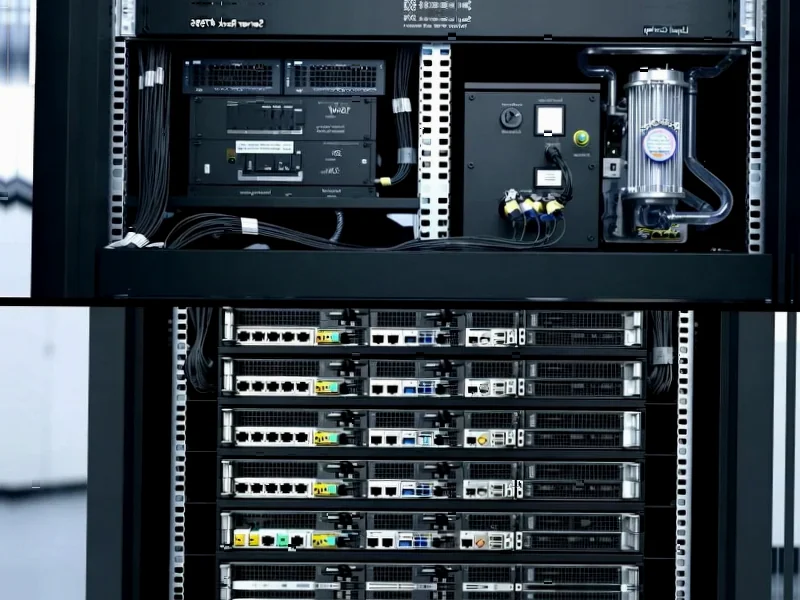According to DCD, Nvidia and Deutsche Telecom have officially confirmed their massive industrial AI cloud project in Munich, Germany. The partnership will deploy more than 1,000 DGX B200 systems and RTX Pro servers containing up to 10,000 Blackwell GPUs in a repurposed data center facility. The installation promises 500 petaflops of compute power and is scheduled to begin operations in the first quarter of 2026. Deutsche Telecom will manage the “several thousand square meter” facility while SAP provides its Business Technology Platform. Already ten companies including Siemens, Agile Robots, Quantum Systems, and Perplexity have signed on to use the AI infrastructure specifically for manufacturing applications.
Europe’s AI Infrastructure Push
This isn’t just another data center announcement – it’s Europe’s clearest shot yet at building sovereign AI infrastructure. Germany’s manufacturing giants have been watching the AI revolution from the sidelines, concerned about data sovereignty and relying on US cloud providers. Now they’re getting their own dedicated playground. The timing is perfect too – just as companies like Siemens need to integrate AI into their industrial processes without shipping sensitive manufacturing data overseas.
Here’s the thing: 10,000 Blackwell GPUs is an enormous commitment. That’s serious hardware dedicated to one region and one specific use case. Nvidia could have spread those chips across multiple customers, but they’re betting big on European industrial AI. And they’re not alone – SAP’s involvement means this isn’t just about raw compute power but about integrating AI directly into business workflows that German manufacturers already use every day.
Who Wins and Who Loses?
This deal is a clear win for Deutsche Telecom, which gets to position itself as Europe’s AI infrastructure leader. They already operate 184 data centers with 390MW of capacity, but this specialized AI cloud gives them a premium offering that Amazon and Google can’t easily replicate with their general-purpose clouds. For Nvidia, it’s another massive enterprise deal that locks in customers before competitors like AMD can gain traction in the enterprise AI space.
The losers? Probably the US cloud hyperscalers who’ve been trying to convince European manufacturers to move their AI workloads overseas. And maybe some of the smaller European AI infrastructure providers who simply can’t compete with this scale. When you’re talking 500 petaflops and 10,000 of the latest GPUs, that’s a barrier to entry that few can match.
But here’s what really interests me: Polarise’s involvement. They’re a European data center specialist, and their participation suggests this isn’t just about throwing American hardware into a German building. There’s a genuine effort to build European expertise and control over this infrastructure. That matters when you’re dealing with industrial secrets and manufacturing IP.
Why Manufacturing AI Matters
The specific focus on manufacturing applications is smarter than it might appear. Germany’s manufacturing sector represents about 20% of its economy – we’re talking about optimizing processes that move billions of euros. Think predictive maintenance on factory floors, quality control through computer vision, supply chain optimization – these aren’t theoretical use cases but immediate business problems that AI can solve today.
And the early customer list tells the story: Siemens for industrial automation, Agile Robots for physical AI applications, even Perplexity bringing its AI browsing capabilities to factory data. This isn’t about building the next ChatGPT – it’s about making existing manufacturing processes smarter, faster, and more efficient. Basically, they’re applying AI where the money already is.
Munich makes sense too – as DC Byte’s market analysis shows, it’s Germany’s third-largest data center market behind Frankfurt and Berlin. But more importantly, it’s in the heart of Bavaria’s manufacturing region, close to the customers who will actually use this infrastructure. That proximity matters when you’re dealing with latency-sensitive industrial applications.
What Comes Next?
With operations starting in Q1 2026, we’ve got about a year to watch this unfold. The real test will be whether German manufacturers actually adopt these AI tools at scale. The hardware is impressive, but will the software and use cases materialize? And can they attract more than the initial ten customers?
I’m also curious about that 500 petaflops number – the source notes it’s unclear what benchmark they’re using. If it’s FP64 performance, that’s absolutely massive for scientific and engineering workloads. If it’s FP8 for AI, it’s still impressive but less revolutionary. Either way, this represents Europe’s most significant move yet to control its AI destiny. And given how much of Europe’s economy depends on manufacturing, they really can’t afford to get this wrong.




